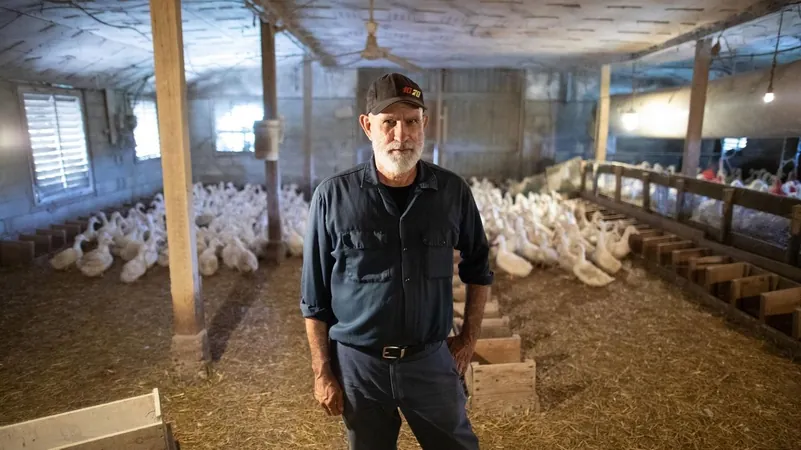
Devastating Bird Flu Outbreak at Crescent Duck Farm: 99,000 Ducks Euthanized
2025-01-23
Author: Ken Lee
Overview of Outbreak
In a heartbreaking turn of events, Crescent Duck Farm in Aquebogue, the oldest and last large commercial duck farm on Long Island, has found itself in a life-or-death struggle against an outbreak of bird flu. Doug Corwin, the president of the family-run farm, confirmed that state and federal agricultural teams are working feverishly on-site, undertaking the grim task of euthanizing nearly 99,000 ducks to contain the highly contagious virus.
Legacy at Risk
Established in 1908, Crescent Duck Farm has long been a recognizable name in the poultry industry, once celebrated for its high-quality ducks. Now, this prestigious legacy is at risk, with Corwin expressing his fears over the future of not just the farm, but of Long Island’s duck industry. 'Is this the end of Long Island duck? I don't know. It could be,' said Corwin, visibly shaken by the situation. 'It’s gut-wrenching.'
Quarantine Measures
The farm is currently housing 10,000 sanitized eggs that are in quarantine, offering a glimmer of hope for reviving the duck strain that has been nurtured over generations. Before these eggs can be hatched, they will undergo rigorous testing to ensure they are free from the virus. Corwin's family has owned the land since the 1600s, and he is now discussing the possibility of selling a portion of it to keep the business afloat, stating, 'My income stream is done right now. I’ve got to rely on reserves.'
Impact on Workforce
Crescent Duck Farm's revenues have come to a standstill, heavily relying on supplying ducks to high-end restaurants. With the outbreak leading to the layoff of 47 employees from a workforce of 75, the situation is dire. The emotional toll on the staff, many of whom have been with the farm for decades, is profound. Corwin recalled the pain in the air as he informed his workers, 'There were a lot of tears; it was very rough.'
H5N1 Bird Flu
The bird flu in question is the highly pathogenic avian influenza, commonly referred to as H5N1. Widespread among wild birds, this deadly respiratory disease has previously been detected in both poultry farms and even dairy cows across the U.S. While human cases remain rare, the World Health Organization has reported significant fatalities among those infected, with recent cases surfacing in the country.
Public Health Concerns
Dr. Bruce Farber, the chief of public health and epidemiology for Northwell Health, alerted the public to the evolving nature of the virus, warning it continues to mutate and could potentially infect other mammals. He reassured residents that currently, the risk to humans remains low but stressed vigilance in monitoring any developments.
Future Steps and Challenges
The onus now lies on Corwin to sanitize the farm and navigate the complicated process for reestablishing a flock from those quarantined eggs. He is pushing for a special state permit and looking into the potential use of a vaccine against H5N1, although federal regulators have yet to approve such measures.
A Legacy at Stake
The resilience of Crescent Duck Farm is not just about economics; it's about preservation of a legacy steeped in history and tradition. As Corwin reflects on the decades of hard work poured into the farm, he asserts, 'This isn’t my job, it’s my life. I’d hate to see it all come to an end this way.'
Conclusion
This profound crisis illustrates not only the fragility of agricultural enterprises amidst biosecurity threats but also serves as a stark reminder of our interconnectedness with wildlife diseases. With public health and local livelihoods at stake, the residents of Long Island and beyond are left hoping fervently for a resolution before it’s too late.

 Brasil (PT)
Brasil (PT)
 Canada (EN)
Canada (EN)
 Chile (ES)
Chile (ES)
 Česko (CS)
Česko (CS)
 대한민국 (KO)
대한민국 (KO)
 España (ES)
España (ES)
 France (FR)
France (FR)
 Hong Kong (EN)
Hong Kong (EN)
 Italia (IT)
Italia (IT)
 日本 (JA)
日本 (JA)
 Magyarország (HU)
Magyarország (HU)
 Norge (NO)
Norge (NO)
 Polska (PL)
Polska (PL)
 Schweiz (DE)
Schweiz (DE)
 Singapore (EN)
Singapore (EN)
 Sverige (SV)
Sverige (SV)
 Suomi (FI)
Suomi (FI)
 Türkiye (TR)
Türkiye (TR)
 الإمارات العربية المتحدة (AR)
الإمارات العربية المتحدة (AR)